
 |

|
|
|
|
Marriages: (1) Marion Shockley, actress (Oct 5, 1939 - ca.1945, divorced) (2) Helen Elizabeth Corbin (May 28. 1947 - May 8. 1964, his death) daughter: Susan Florette Schackow (May 2. 1948 - ) Sibling: Rita Florette Krieger (May 25. 1913 - Aug 1. 1982) |
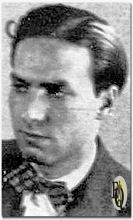 |
| Above right: George J. Zachary around 1937. | |
|
George Jacques/Joseph Zachary was born on June 1. 1911 in New York, N.Y. His parents Jacques "Jack" Zaharia (Mar 13. 1878 - Apr 19. 1943) and "Lea" Florette Lobell/Loebel (Apr. 1. 1891 - Jan 22. 1920) were immigrants from Romania. They were married in Manhattan on June 8. 1910 George's father worked as a dentist. Zachary attended New York University where graduated with a Bachelor of Science degree in 1931. Afterwards he teached English and Dramatics at a High School. He was a pretty good amateur violinist, but his chief hobbies were building radio sets and dreaming about radio production. He had a remarkable collection of more than 2000 recordings, including many rare works. **** He decided to see if his dreams were practical and applied for a position at CBS (1936) where he would work for 6 years. He was taken on initially as a production man/ scriptwriter (continuity writing) for dramatic programs but soon, as an apprentice, he was allowed to try out some of his ideas. His interest drove him towards musical entertainment. When it came to music on radio his chief feeling was that musical programs did not explore a broad enough field. He discovered that radio had certain limitations, and acquired a healthy respect for a budget. According to George Zachary, music broadcasting also needed a “production man,” who timed programs, placed musicians in the studio to achieve a good sound balance, and arranged the length and sequence of announcements. The skills required for this position were knowledge of music literature, score reading, knowledge of the various functions of microphones, and the basics of radio engineering. 6 Starting in 1937 he became a writer for The Columbia Workshop, soon turning director/producer (1938, 1940 and 1941). Men Against Death (CBS, Jun 30. 1938 - Apr 29. 1939) followed the one-man campaign of writer Paul De Kruif against disease, hunger, and poverty. Each week a dramatization of some incident from one of De Kruif's five books on medical history was put on the air by a Federal Theatre cast under the direction of George Zachary of the CBS program department.
In 1939, at CBS,
producer Zachary was gathering his team
for the radio version of The Adventures of Ellery Queen. In
order to attract a more female audience, Dannay, Lee and Zachary added a new
character to the stories: Ellery's secretary Nikki Porter.
Marion Shockley was one of many who auditioned for the role. George Zachary,
then the director of the show, didn't want Marion. George argued that Marion
just wasn't right for the part, but three other Network officials outvoted
him and the Shockley girl got the role, thus becoming the first actress to
portray Nikki Porter, Ellery's secretary and low-key love interest.
In a special program of The
Columbia Workshop directors Earl McGill and George Zachary were acting out
an Ellery Queen mystery "The Strange Case of the Leap Year"
without a story on February 29. 1940. It's CBS's idea of celebrating Leap Year.
In this episode everyone was going to do things they ordinarily didn't do ... |
|
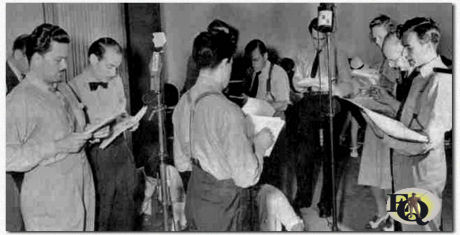 Above: Director George Zachary (right) directs a rehearsal of a Columbia Workshop play (1940). |
|
|
He directed the first episode "Battle of Music" (Jul 15. 1940) for the failed radio series Forecast. Given his interest it's no surprise George directed this one. "An entertaining battle of the bands", using a symphonic orchestra and a swing band to play one on one, vying for the title of "the better band." Albert Spaulding supplied the violin music. Gordon Gifford and Joe Venuti also performed. For Ellery Queen, it was rumored the deft direction of Zachary was "tossed away" solely because he was not a Young & Rubicam man. He was retained on the payroll because he was part of the package price, but largely to twiddle his thumbs and eat his heart. Lee and Dannay had a series of quarrels with the producers and executives of Young & Rubicam. After one particularly violent blow-off, the two writers refused to have any dealings with the Y&R director of the show. All communications had to be relayed by CBS director Zachary. (Sep 1940) He and Marion lived at 100 West 55th Street New York, N.Y. |
|
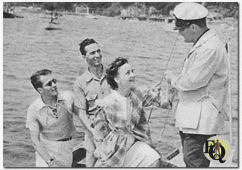 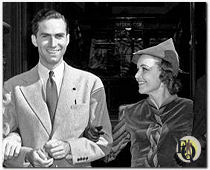 Above left: Nikki and Ellery are as attractive in real life as they are on the air. Leaving the skiff for Mark Warnow's yawl are, left to right, Ellery Queen, radio's super sleuth, in real life, Hugh Marlowe; George Zachary, producer and director; Nikki Porter (Marion Shockley); Warnow is on deck. - ED (Picture by Walter Seigal) (from Radio Guide 40-01-05) Above right: Detail from a 1939 publicity shot for Ellery Queen, producer George J. Zachary and actress Marion Shockley. |
|
|
In November 1940 it was announced that starting Dec 1. Zachary would direct a new Coca Cola musical series. Tabbed Company's Coming with the sub-billing To Your House from Coca-Cola the fixtures on the program were Albert Spalding, m.c. and soloist Andre Kostelanetz. George Zachary directed and the script was by George Faulkner. In essence the program was a modification from Battle of Music, without Raymond Paige or the classic-versus-swing idea. Zachary at that time also directed Short, Short Story for Campbell's soup. Furthermore Zachary was also set on handle Ellery Queen when it returned to the air. At least for a short period he was named chief of radio production of the N.Y. Ward Wheelock agency (Feb 1941). George also directed The Campbell Playhouse (Nov 29. 1940 to Jun 13. 1941, initially with creative input by Orson Welles) and Goodrich Rubber's 100 Men and a Girl programs. In March 1941 newspapers reported "Negro Poems To Be Dramatized On CBS Network". "Two poems expressing the deep emotionalism of the Negro race are to be dramatized by the Columbia Workshop and presented on Sunday March 30." George supervised and directed both productions. * |
|

|
It was only when, in 1942, Zachary left Ellery Queen to become the program chief for the radio bureau of the Office of War Information he openly acknowledged his marriage to Marion Shockley. As head of the newly-created production division. He supervised all programs produced by the Radio Bureau, which under the reorganization absorbed the former radio division of the Office of Emergency Management, and he will act as advisor to all Government departments and bureaus on programs designed to aid the war effort. He came in charge of all programs produced for OWI, WPB, OPA and OBT. ** Hobe Morrison, the drama editor and Broadway critic of Variety set up the meeting in 1942 of six leading directors (not acquainted until then) in an inconspicuous rear booth in Sardi’s restaurant to discuss formation of what became "The Radio Directors Guild". Taking office in the Berkshire Hotel, NY, in May 1942 with an initial charter membership of 37 radio directors from advertising agencies, networks and the free lance field, the Guild was formed with George Zachary, freelance director as president. A position which he held at least until December 1943. Other co-founders included directors Irving Reis, Orson Welles, Norman Corwin, Earl McGill, Jerry Devine (?) ...
George continued as active director of the Sunday
afternoon show The Pause that Refreshes on the Air.
The Andre Kostelanetz show for Coca-Cola
went to the Coast for a single broadcast December 27. to premiere the music from
the new Walt Disney picture, Saludos Amigos. The trip was arranged
through the Office of the Coordinator of Inter-American Affairs, which is
plugged 'Saludos' because of its Latin-American subject matter. The
film was
produced by Disney from cartoon and live footage made during his South
American trip last year. Zachary's directed a new OWI-Mutual weekly series My People depicting "The Negro In War Effort". It featured guests of all walks of life. Mrs. Franklin D. Roosevelt, singer Roland Hayes and two prominent "Negro educators" were on the first program February 13. 1943 which also featured a dramatic tribute to Abraham Lincoln. * In July 1943 Marion was reportedly "an expecting mother" however, she and George were not blessed with a child. Starting September 1943 Marion was replaced for nine weeks because of "serious illness" on Ellery Queen by Helen Lewis. The couple divorced ca. 1945 George produced and directed a nationwide radio salute to the Third War Loan Drive in 1943. The show included a speech by President Franklin D. Roosevelt and performances by Bing Crosby, Jimmy Durante, Charles Boyer, Ronald Colman and Robert Young. Despite the potpourri of moods and entertainment facets, the whole thing had the aspect of an adroitly fitted mosaic. The timing was faultless, which fact gave special emphasis to the skillful direction of George Zachary. In November 1943 the chief of the OWI Domestic Radio Bureau announced that Zachary had resigned as Chief of the Production and Editorial Division. Reportedly he had also been handling radio for the Treasury dept. By the start of 1944 he worked on NBC Saturday nights and had been appointed a lieutenant (j.g.) in the Navy, reporting for duty January 15. So from 1944 to 1946, Zachary served overseas in the Navy and won a Bronze Star. He served on the staffs of Admirals Nimitz and Halsey. After being released from the Navy he was signed by Kenyon & Eckhardt, New York to produce summer edition of Ford Sunday Evening Hour on ABC. So lovers of music... classical selections, folksongs, popular tunes from Motion Pictures and Tin Pan Alley were treated to Ford's new summer show Festival of American Music (ABC-KECA) on June 30. 1946. "There have been many programs of American music on the radio," said George who produced the program from Hollywood., "but rarely has anyone attempted to cover the entire range of musical endeavor. 'The Ford show' will give a panoramic view of American Music, stemming from its humble origins among the people through its growth to full stature on the screen, stage and in the concert hall." Composer and conductor Leigh Harline conducted and Alfred Drake, baritone and star of Oklahoma was the singing master-of-ceremonies. It ran for 13-weeks. Around this time he divorced Marion Shockley. He returned to CBS as a television director. While he did make the transition to TV he kept a special place in his heart for radio actors "It's perfectly true the radio actor lacks the opportunity for development he would have in the theater, but his whole performance has a different purpose and perspective. I know of no radio actors whose performances improve perceptibly with rehearsal. If a regular radio actor doesn't get a characterization right with the first reading, there's no use trying to change him, I know I'm in a hole, but I generally expect a bad first reading from a stage actor, and it doesn't worry me. I know he has to grow in the part and it will be much better in performance. But radio actors are vastly superior to stage actors in radio-acting technique. Radio has developed the most versatile group of actors ever known to the entertainment field!" On September 14. 1946 the Guild came of age and were granted an International charter by AFL. Which meant the union, now autonomously could charter locals, make its own laws and could administer its own funds. Billboard reported on September 21. 1946 George as president of "The Radio Directors Guild". While newspaper report described it as only temporary. On February 5. 1947 Variety reported that had re-opened its network contract insisting on a 20% cost of living wage increase. Plans and agenda were discussed by their president George J. Zachary. By May Ed Byron had succeeded him and George remained as vice-president. On May 28. 1947 he married Helen Elisabeth Corbin *** in Princeton, Mercer, New Jersey. In 1947 George went up and down the country. To Hershey, Pa., to produce The Vaughn Monroe show for Camel (Aug 1947), and to Atlantic City (Sep 1947) for next week's stanza. For Ford Theatre George produced/directed the first season (Oct 5. 1947 - Jun 27. 1948) of new weekly series of hour-long dramatizations over NBC with the best works of stage, screen, radio and literature, both old and new, in addition to original plays. The opening drama (October 5. 1947) was a modern adaptation of Mark Twain's The Connecticut Yankee made by Lilian Schoen. On November 16. he directed an hour-long radio adaptation of Carmen Jones, the Oscar Hammerstein II version of Carmen with the original music by George Bizet. George Zachary's directed TV's Studio One starting with Dashiell Hammett's "The Glass Key" on April 13. 1948 The director, tried some fancy visuals, such as a thug punching at the camera lens — as gratuitous, and as charming, as the cowboy shooting at us in the 1903 Great Train Robbery. There are also inserted bits of film footage, a practice that would continue throughout the Golden Age. George was replaced as one of the show's regular directors by John Peyser in 1950.
On May 2. 1948
Helen and George were blessed with a daughter Susan Florette.
At the time
George
still
worked for Kenyon & Eckhardt, Detroit as producer director for
The Ford Theatre.
So when in June that year Ford Theatre went off the air for
summer, producer-director George Zachary, nixed his other assignments to take
his first vacation in seven years. He and his wife and daughter spend July,
August and September in Weston, Conn. In the instance of Ford Theatre, K & E will have second performance rights, with $1,000 ("half of the original fee") going to the writer. Hence the writer's privileged to dicker for pix, stage, tele or any other sales. As its first producer George Zachary tried to use good but not too famous radio performers. So he went with popular radio stars instead of Hollywood stars which offered limited success. Low ratings forced the replacement of Zachary with Fletcher Markle. The show moved to California and began starring celebrities from Hollywood. This combination made for a hit radio show. |
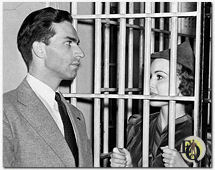 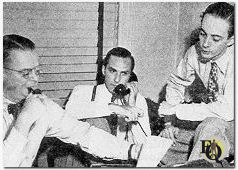 Above left: Another detail from a 1939 publicity shot for Ellery Queen, producer George J. Zachary and actress Marion Shockley. Above right: George Faulkner (continuity chief), George Zachary (writer producer) and Howard Teichmann (script editor) hammer out another Ford Theater production (Feb 1948). |
|
When Frederick (Ted) Long was named associate director of the radio and television department of Geyer, Newell & Ganger by the end of August 1949, Zachary resigned as television producer and director at CBS to accept his new appointment.
In July 1949 the talent unions in radio (of which "The Radio
Directors Guild" was one of the top three) had become alarmed over the revelation
of a "blacklist" designed to remove many of them from the employment ranks. When
William Sweets (former president of RDG) had been forced to resign as director of Gang Busters
and Counterspy because of sponsorship pressure on packager Phillips
Lord. The unions alerted themselves to the possible repercussions and gang up on
those linked with Commie-tainted activity and held "suspect." NBC's Embassy Club aka Bob & Ray made it's debut on October 7. 1952 Bob Elliott & Ray Goulding returned in new weekly series which featured Florian Zabach, violinist, and Audrey Meadows, Broadway musical comedy star. George directed. In 1953 he left CBS and became an executive vice president and partner in advertising firm of Platt, Zachary & Sutton. Zachary had a wide experience in radio and television as a director and producer. Among the many television programs he has produced or directed are The Web (CBS, Jul 1950), Playhouse of Stars (1951 - 1959), The Life of Riley (1944 - 1951) and It Pays to Be Ignorant (1949 - 1951). Other radio programs he worked on include Gang Busters (1949 - 1950), The U.S. Rubber Show, and Father Knows Best (1950 - 1954). Given this experience it came as no surprise that George was appointed radio and television producer manager for Lever Brothers co. (Aug 1954). He was responsible for the production of Lever's radio and television programs and commercials by the company's advertising agencies and for the development of new programs and talent. He kept contact with the Lever agencies and kept a close watch on media, staying alert for programs that Lever Brothers hadn't tried, but which seem to hold worthwhile potentialities.
One example was Big Town. Lever Bros. had bought
the show as its own package in 1937. In December 1955 it netted it's
heaviest listener responses in the program's 18-years (5 of them spent in TV
alone). At the time for a $ 1,000-PRIZE essay contest the asked Big Town
viewers in the 11-19 year age group to submit essays on the subject
"How I Would Solve the Juvenile Delinquency Problem." It attracted more than
15,000 replies.
Around August 1958 George Zachary resigned as radio- TV
program manager of Lever Bros. and took a two-month combined "business and
pleasure" trip to Europe with his family. Reportedly Mr. Zachary was
involved with a package production firm upon his return. He was responsible for production and supervision of radio's Have Gun, Will Travel (1958 - 1960). George died of a heart attack in Sarasota, FL, May 8. 1964 where he had been living for several years. He was only 52 years old. |
|
Notes: * George's work almost seems to be driven by the later Ellery Queen "anthem" to "...fight against crime- not only crimes of violence and crimes of dishonesty, but also crime of intolerance, discrimination and bad citizenship". Although (newspaper) formulations at the time seem to indicate that it still needed several decades to be worthy of their intent. ** WPB (War Production Board) , OPA (Office of Price Administration) and OBT (Office of Business Transformation). *** Helen Elisabeth Corbin (Sep 10. 1909, Rockville, MO - Feb 15. 1986, Gainesville, FL) **** When papers published the fact that George Zachary, CBS director, had 2,000 records & didn't know how to stack 'em, admiring fans sent in dozens of letters with suggestions & at least 3 home carpenters mailed detailed plans for easy-to-build cabinets. Programs or dates in red still need confirmation. |
|
Click on Uncle Sam if you think you can help out...!
|
|
Other references
Additional video & audio
sources |
|
This profile is a part of
Ellery Queen a website on deduction.
The person above produced and directed episodes
of an
Ellery Queen radio series.
Click Uncle Sam if you think you can help
out...! Many of the profiles on this site have been compiled after very careful research of various sources. Please quote and cite ethically! |
|
Page first published September 18. 2022 Version 2.1 - Last updated April 24. 2025 |
 b
a c k
t o L i s t o f S u s p
e c t s
b
a c k
t o L i s t o f S u s p
e c t s
|
|
| Introduction | Floor Plan | Q.B.I. |
List of Suspects | Whodunit? | Q.E.D. | Kill as directed | New | Copyright Copyright © MCMXCIX-MMXXV Ellery Queen, a website on deduction. All rights reserved. |